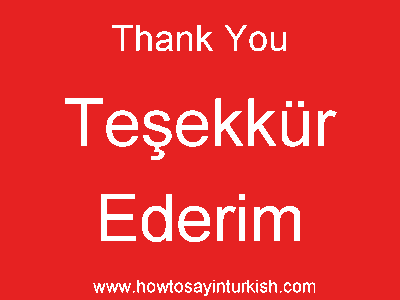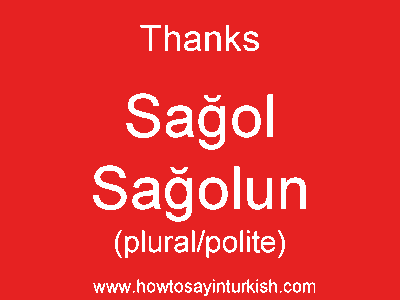How To Say Thank You In Turkish: A Comprehensive Guide To Expressing Gratitude
When you're traveling to a new country or connecting with people from a different culture, one of the first and most important phrases to learn is "thank you." It's a universal sign of politeness and appreciation, and in Turkey, where hospitality and courtesy are deeply ingrained in the culture, knowing how to express gratitude effectively can open many doors and foster genuine connections. If you're visiting Turkey, the Turkish-speaking part of Cyprus (The North), or simply have Turkish friends, you'll quickly notice that most Turks are incredibly polite and value respectful communication.
While many language learners might default to the most common translation, "teşekkür ederim," there's actually more than one way to say "thank you" in Turkish. And here's a little insider tip: locals don't just stick to "teşekkür ederim" all the time. If you want to blend in, sound more natural, and truly show your appreciation, understanding the nuances of Turkish gratitude is key. This guide will walk you through the different ways to say "thank you" in Turkish, from formal to casual expressions, complete with examples and usage tips.
The Mainstream "Thank You": Teşekkür Ederim
Let's start with the phrase you'll hear most often and can confidently use in almost any situation: Teşekkür ederim.
This is the most widely used and versatile formal expression for "thank you" in Turkish. It's your go-to phrase when you're interacting with strangers, shopkeepers, restaurant staff, or anyone you're not intimately familiar with. It translates directly to "I thank you" or "I do thank."
- Usage: Use it when you receive help, a service, a gift, or simply want to express general appreciation. It's polite, respectful, and universally understood.
- Pronunciation Tip: "Teşekkür" (teh-shek-kewr) and "ederim" (eh-deh-reem). The 'ş' is like 'sh' in English, and the 'ü' is like the 'u' in French 'tu' or the 'ew' in 'few'.
For situations where you want to express even deeper gratitude, you can add an intensifier:
Çok Teşekkür Ederim: For Emphatic Thanks
If a simple "thank you" doesn't feel strong enough, you can say Çok teşekkür ederim. The word "çok" (chok) means "very" or "much." So, "Çok teşekkür ederim" translates to "Thank you very much" or "I thank you very much."
- Usage: Perfect for when someone has gone out of their way to help you, or when you're truly overwhelmed with gratitude. For instance, if someone helps you find your way when you're lost, or offers significant assistance.
Teşekkürler: A Shorter, Slightly Less Formal Option
You might also hear or use Teşekkürler. This is a slightly shorter and a touch less formal version of "teşekkür ederim," often used as a quick "thanks." While still polite, it’s more common in casual settings or quick exchanges rather than deeply formal ones. It's akin to saying "Thanks!" instead of "Thank you very much."
The Informal "Thank You": Sağ Ol and Sağ Olun
To truly sound like a local and blend in, you'll want to master the informal way of saying thank you: Sağ ol.
This expression is widely used among friends, family, and acquaintances. It's incredibly common and gives your Turkish a much more natural feel. The literal translation of "sağ ol" is quite interesting: "sağ" means "alive" or "healthy," and "ol" means "be." So, "sağ ol" literally translates to "be alive" or "be well." It's a wish for well-being in return for a kindness.
- Usage: Use "sağ ol" with people you know well, your peers, or anyone in an informal setting. It's perfect for casual favors, friendly gestures, or when someone simply passes you something.
- Pronunciation Tip: "Sağ" (sah) - the 'ğ' is a soft 'g' sound, almost silent, lengthening the preceding vowel. "Ol" (ol) - like 'ol' in 'old'.
Sağ Olun: The Plural or Respectful Informal
Just like in English where "you" can be singular or plural, Turkish has distinct forms. If you're thanking more than one person, or if you want to show a bit more respect to someone you're still on informal terms with (perhaps an older acquaintance or someone you want to show extra deference to in an informal context), you would use Sağ olun.
The "-un" ending makes it plural or more formal. It's a subtle but important distinction that shows your understanding of Turkish social etiquette.
Specialized Gratitude: Elinize Sağlık
Beyond the general "thank yous," Turkish offers specific phrases for particular situations, adding a layer of cultural richness to your expressions of gratitude. One such beautiful phrase is Elinize sağlık.
This phrase literally translates to "health to your hands." It is a special phrase used specifically when someone has done something with their hands, whether it's cooking a delicious meal, crafting something beautiful, fixing something, or performing any task that required manual effort and skill.
- Usage:
- After someone cooks you a meal: "Bu yemek harika! Elinize sağlık!" (This food is amazing! Health to your hands!)
- When someone has fixed something for you: "Teşekkür ederim, elinize sağlık!" (Thank you, health to your hands!)
- After someone has created a piece of art or handicraft.
- Cultural Note: This phrase is a warm and appreciative way to acknowledge the effort and skill involved in a task. It's a highly valued compliment in Turkish culture.
Why So Many Ways? Cultural Nuances and Blending In
The existence of multiple ways to say "thank you" in Turkish isn't just about linguistic variety; it reflects the deep politeness and hierarchical awareness embedded in Turkish culture. Turks are generally very polite, and choosing the right form of address and gratitude demonstrates respect and understanding.
As the data suggests, locals don't just stick to "teşekkür ederim" all the time. Varying your expressions of thanks shows that you've made an effort to understand their language and customs, which is always appreciated. Using "sağ ol" with friends will make you sound more natural and approachable, while "teşekkür ederim" remains your reliable formal option.
Learning these different ways allows you to:
- Blend In: Sound more like a native speaker and less like a tourist.
- Show Respect: Use the appropriate level of formality depending on the person and situation.
- Foster Connections: People appreciate when you speak their language, even if it's just a few phrases. It shows genuine interest and effort.
- Express Nuance: Convey the exact level and type of gratitude you feel, from a quick "thanks" to a heartfelt "thank you very much for your hard work."
Putting It All Together: Usage Tips
Here’s a quick guide to help you decide which "thank you" to use:
- For most situations, especially formal or when unsure:Teşekkür ederim
- For emphasizing gratitude:Çok teşekkür ederim
- For quick, general thanks (slightly less formal):Teşekkürler
- For friends, family, and casual acquaintances:Sağ ol (singular)
- For multiple people or showing more respect in an informal context:Sağ olun (plural/more respectful)
- When someone has used their hands to do something for you (cook, fix, create):Elinize sağlık
Remember, practice makes perfect! Don't be afraid to try out these phrases. Turkish speakers are generally very encouraging of language learners.
Final Thoughts
Learning how to say "thank you" in Turkish is more than just memorizing a few words; it's about embracing a culture of politeness and appreciation. From the widely accepted "teşekkür ederim" to the casual "sağ ol" and the specific "elinize sağlık," each phrase carries its own weight and context. By understanding and using these different expressions, you'll not only communicate your gratitude effectively but also build stronger connections and show genuine respect for Turkish culture. So, go ahead and start practicing – your efforts will surely be appreciated!

How do you say "Hello" and "Thank You" in Turkish? : How to say in Turkish

Как сказать спасибо по турецки: 4 шагов

How do you say "Hello" and "Thank You" in Turkish? : How to say in Turkish